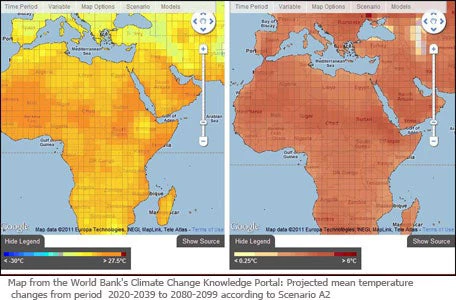Decisions about climate change are complex, costly and have long-term implications. It is therefore vital that such decisions are based on the best available evidence. We need to understand the quality and provenance of that evidence, and whether any assumptions have been made in generating it.
The analysis needed to underpin climate change decisions is like putting together the pieces of a jigsaw. We need observations of weather, climate, water resources and agriculture and other sectors. We also need to analyze the links between these and human and ecosystem development. We need to provide model projections of the future for all these elements. Finally specialists in different sectors need to work with scientists to interpret the information in a way that is relevant to them in order to make informed decisions.
The World Bank's Climate Change Knowledge Portal helps to draw climate change and related information together in one place and is a useful additional tool in the armoury for the decision maker.
The Met Office Hadley Centre in the UK has been preeminent in monitoring, analyzing and projecting climate and climate change and has been and is still a major contributor to IPCC. But more importantly we work closely with government to ensure that their decisions are underpinned by sound science.
Building on this experience we are working with an increasingly wide range of partners and stakeholders across the world to build Climate Services as part of the World Meteorological Global Framework on Climate Services.
The vital importance of using climate change information, ‘meshed’ with environmental and socioeconomic data is demonstrated in the UK where the Met Office have worked with the Environment Agency to help them assess the implications of sea level rise for flood defenses.
Internationally, the Met Office is working with scientists in Africa on a Climate Science Research Partnership (CSRP) in a programme funded by the Department for International Development (DFID). The programme aims to provide improved predictions of climate variability and change. The availability of data, information and advice of climate variability and change in regions such as Africa is patchy. The data and projections generated by this project are being made easily accessible through the project website and results are fed through to users through the Regional Climate Outlook Forums. Provision of information and data alone is not sufficient for people to make decisions. They also need to understand how to use the information. There, an important part of this programme is improved knowledge management through a fellowship scheme for 11 African scientists and training workshops for small groups of scientists.
Continued co-operation between national, international institutions and governments is essential to ensure the most efficient and effective use of this all important climate change information. The World Bank's Climate Change Knowledge Portal is a useful platform for providing and sharing data and information, encouraging cooperation and informed decision-making. The attractiveness of the site and depiction of the data and its ease of use will encourage people to see this as a first port of call for basic climate change and related information.



Join the Conversation